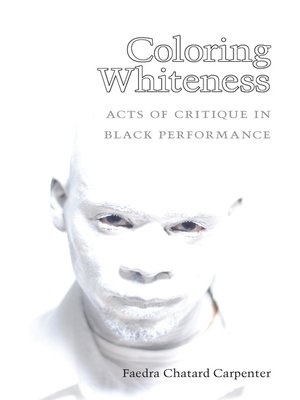Coloring Whiteness
ebook ∣ Acts of Critique in Black Performance · Theater: Theory/Text/Performance
By Faedra Chatard Carpenter

Sign up to save your library
With an OverDrive account, you can save your favorite libraries for at-a-glance information about availability. Find out more about OverDrive accounts.
Find this title in Libby, the library reading app by OverDrive.



Search for a digital library with this title
Title found at these libraries:
| Library Name | Distance |
|---|---|
| Loading... |
Reading representations of whiteness by contemporary African American performers and artists|Coloring Whiteness pays homage to the ways that African American artists and performers have interrogated tropes and mythologies of whiteness to reveal racial inequalities, focusing on comedy sketches, street theater, visual art, video, TV journalism, and voice-over work since 1964. By investigating enactments of whiteness—from the use of white makeup and suggestive masks, to literary motifs and cultural narratives regarding "white" characteristics and qualities—Faedra Chatard Carpenter explores how artists have challenged commonly held notions of racial identity. Through its layered study of expressive culture, her book considers how artistic and performance strategies are used to "color" whiteness and complicate blackness in our contemporary moment.
Utilizing theories of performance and critical race studies, Coloring Whiteness is also propelled by Carpenter's dramaturgical sensibilities. Her analysis of primary performance texts is informed not only by traditional print and visual materials, but also by her interviews with African American theater artists, visual artists, and cultural critics. The book is an invaluable contribution to the fields of theater and performance studies, African American studies, cultural studies, critical race studies, and American studies.
Utilizing theories of performance and critical race studies, Coloring Whiteness is also propelled by Carpenter's dramaturgical sensibilities. Her analysis of primary performance texts is informed not only by traditional print and visual materials, but also by her interviews with African American theater artists, visual artists, and cultural critics. The book is an invaluable contribution to the fields of theater and performance studies, African American studies, cultural studies, critical race studies, and American studies.







